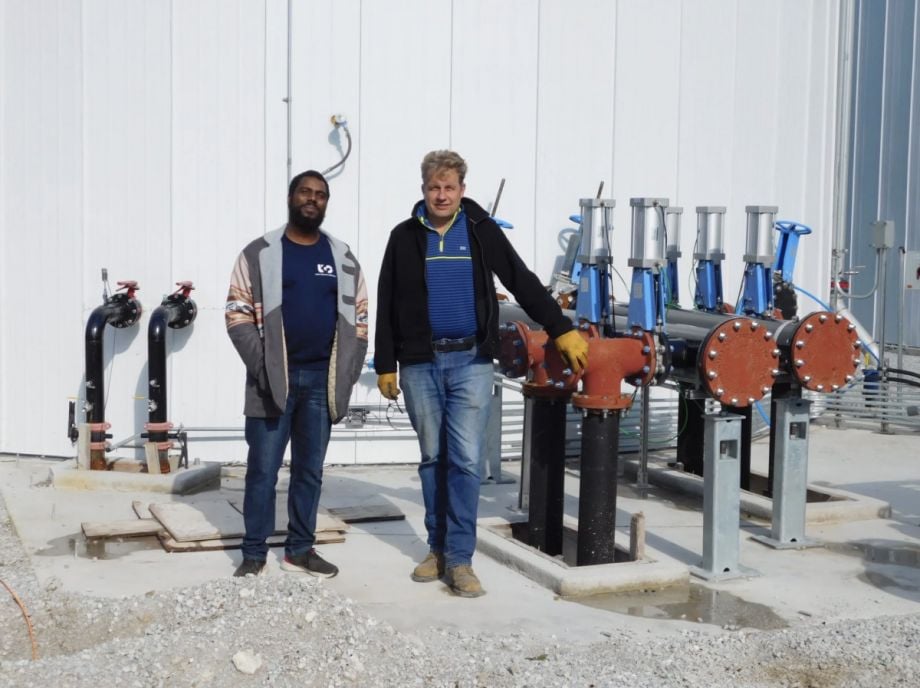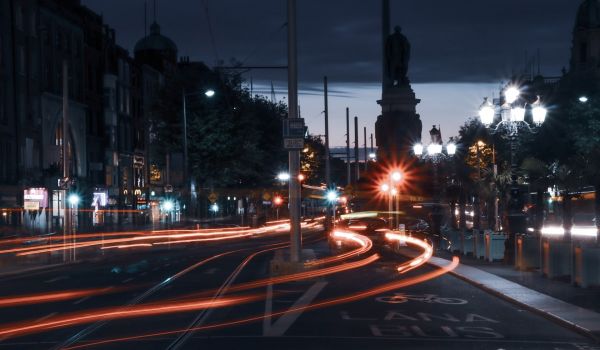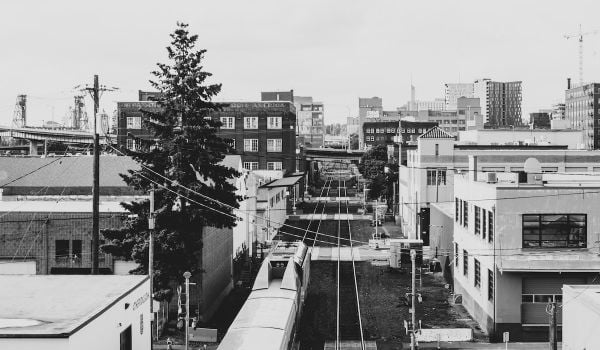This story was originally published by Energy News Network.
Auburn Gresham is not what anyone would consider a typical high-tech hub. The community on Chicago’s South Side has suffered from decades of disinvestment and racist redlining practices.
But it is also home to a state-of-the-art anaerobic digester capable of diverting tons of food waste into rich compost, commercial-grade fertilizer and pipeline-ready biogas. And that’s just the beginning of the story for Green Era Campus.
The project’s developers envision that when completed, the site will provide workforce development in the clean energy economy, a much-needed source for fresh produce within a food desert, and inviting green spaces for residents of all ages.
‘Activate everybody’
Like the other nine communities included in Mayor Lori Lightfoot’s signature Invest South/West initiative, Auburn Gresham, with a population that is 96% Black, has suffered from decades of disinvestment. It is a food desert with a 16.5% unemployment rate. More than 60% of households have annual incomes below $50,000. Residents of the community — including students attending several schools in the area — have been routinely and disproportionately exposed to harmful emissions, and suffer significant levels of chronic illnesses as a result.
To date, Invest South/West has largely been limited to plans on the drawing boards with few tangible developments. However, as one outgrowth of the initiative, the $32 million, state-of-the-art anaerobic digester at Green Era Campus has been essentially complete since August 2022, with plans to open the site to the public in January 2023.
Green Era Campus won the Climate Change Adaptation category of the prestigious Climate Challenge Cup, an international competition awarded during the United Nations 2021 Climate Change Conference in Glasgow. The campus and its digester, believed to be the first of its kind operating on a large scale in an urban area, was financed in part by Chicago Community Loan Fund, along with a combination of grants and private investment funds.
Urban Growers Collective oversees the operations of Green Era Campus as part of a three-way partnership with Green Era Sustainability and Green Era Educational NFP — the latter owns the site and serves as the development entity for the campus. Active engagement of community residents to take a hands-on role in promoting climate mitigation in their own communities has been baked into the entire development of Green Era Campus.
One prominent aspect of this engagement is encouraging residents to dispose of organic compostable wastes responsibly, which dovetails into the mission and purpose of the digester, says Erika Allen, who wears multiple hats in the operation of the campus as a co-founder for both Urban Growers Collective and Green Era.
“That’s a big part of the strategy, just to be climate-prepared, to be able to start shifting away from fossil fuels — to activate everybody in not throwing compostables away, but [have] our food to continue to recirculate, and have a thriving green economy within the neighborhood,” Allen says.
What makes the project unique
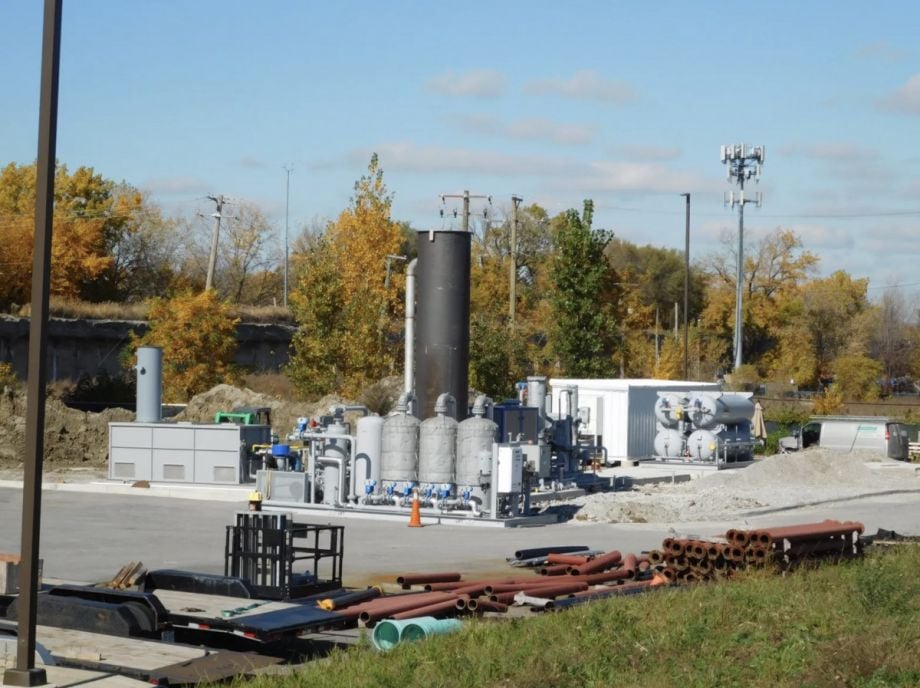
Some of the equipment at the Green Era Campus. (Photo by Audrey Henderson)
Green Era Campus is situated on nine acres of a former brownfield that served as an impound lot for the city of Chicago until 2010, and was also blighted with illegally dumped trash. The entire site had to undergo extensive remediation to eliminate accumulated contaminants when Green Era Educational NFP acquired the property from the City in 2015 — for $1, on an “as is” basis.
“If you live on the South Side of Chicago, you’re twice as likely to develop asthma,” says Vernon Fleming, former mission director of Urban Growers Collective. “And that’s because of the negative air pollution [that] impacts a local community. A prima facie benefit of clearing out all of this contaminated land material and debris is having a positive impact on our local air quality.”
A master plan for the campus was developed in 2018, with completion projected for the first quarter of 2023. Construction and development of the campus will generate approximately 270 temporary jobs, with more than 30 permanent jobs associated with digester and greenhouse operations. Personnel from Ohio and Europe presently oversee everyday operations at the digester — although plans are for the engineers to train local residents to eventually take the reins.
McBride Kelley Baurer, a woman-owned firm in Chicago, served as architects and planners for the site. Ujamaa Construction, a Black-owned company with locations in Chicago and Atlanta, partnering with Chicago-based Pepper Construction, performed construction of the facility, along with site improvements.
Green Arrow Engineering, based in Wooster, Ohio, was responsible for the installation of the digester. Head engineer Clemens Halene, originally from Germany, executed its state-of-the-art design. Much of the technology integrated into the workings of the digester is proprietary and closely guarded.
“The U.S. is far behind technology compared to its EU counterparts, about 10 or 15 years,” Fleming says. Germany alone has nearly 10,000 biodigesters, compared to around 2,300 in the U.S., according to the American Biogas Council. Of the U.S. digesters, only 66 stand-alone systems process food waste.
The Green Era Campus digester and commercial compost facility is expected to divert 85,000 tons of food waste and organic matter from landfills each year. Inorganic wastes such as metals, plastics and glass are eliminated prior to processing. Digester operations include a 1.7-million-gallon processing tank, a 320,000-gallon holding tank and a 5,000-square-foot facility for methane processing — cleaning the methane of impurities so that it is pipeline quality, Halene says.
“We are converting organic-to-organic fertilizer and biogas,” Halene says. “And then the biogas will be refined to bio methane and then injected into People’s Gas [utility company] pipelines. On the back end we will have basically ammonia, and make a certified organic fertilizer out of this as well. … [Green Era] will have compost — very fertile compost.
“In the beginning we burned the CO2 with a little bit of methane because we are not allowed to vent it. But in the second phase, we are actually capturing the CO2 and making food grade CO2, for bottling and drinks, et cetera.”
Engaging the community
The digester, while integral to the site, represents just one aspect of its overall development.
When completed, Green Era Campus will include a commercial compost producer, a retail storefront and nursery, job training for community residents and formerly incarcerated individuals, and a small business incubator. Additional plans include a walking trail and edible forest where residents — especially seniors — can rest and relax, and an amphitheater for spectator events. Separate entrances for trucks and the public minimize exposure by community members to diesel exhaust fumes.
A community educational center will house a state-of-the-art teaching kitchen, sourced by a 40,000-square-foot aquaponic and hydroponic greenhouse. Presently there are a handful of raised bed produce containers on site, with supplemental produce brought in from eight farms run by Urban Growers Collective. Ultimately the campus will feature a full-fledged raised bed urban farm where residents will be welcome to gather fresh produce.
“So, if you want any fresh off-season strawberries in the dead of the Chicago winter, you can come up to Green Era and get [strawberries] right here as well,” Fleming says.
Community input has been integral in shaping each phase of the development of both the campus and the surrounding area. There has especially been a conscious emphasis on avoiding gentrification and displacement, Allen says.
“There’s a huge mosaic that got put in [on the viaduct over 83rd Street near Green Era Campus] that we were able to host and reflect the ideals of the project. And so that mosaic really represents sort of the future of what the project brings, just lots of different entities coming together to support the redevelopment of the community, meaning that as we begin to flourish that we’re not displacing longtime residents,” Allen says.
To that end, Chicago public school students in the area were asked to create drawings of their visions of green spaces and sustainable developments. The pictures, posted on a wall within the digester facility, illustrate various aspects of the facility and its surroundings, including the compost and farm stand, along with the nearby Metra commuter rail station.
The drawings are not just decorative — they serve as actual input for the ongoing development of the campus, Fleming says.
“This is something that we work with our students to do because we want to know what they envision for this space in their community too. And we actually take that back to our architects to see if we can design and incorporate some of that into our sites,” Fleming says.
The end goal of Green Era Campus is to enhance the overall quality of life in Auburn Gresham, in addition to providing climate mitigation and functioning as a clean energy operation, Allen says.
“Post pandemic with so much loss, it’s very healing to not just have access to a space, but to be part of it. I don’t have to leave my community for those resources, to gain wealth or to be successful. These are things that we can do in our own communities.
“Especially, young people can get really excited. Their eyes light up when they see this is for them and that they can build a future. They’re part of the future, which is an important psychological strategy,” Allen says.
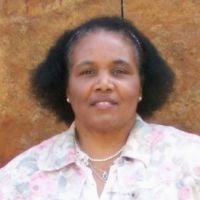
Audrey F. Henderson is a Chicagoland-based freelance writer and researcher specializing in sustainable development in the built environment, culture and arts related to social policy, socially responsible travel, and personal finance. Her work has been featured in Transitions Abroad webzine and Chicago Architect magazine, along with numerous consumer, professional and trade publications worldwide.

